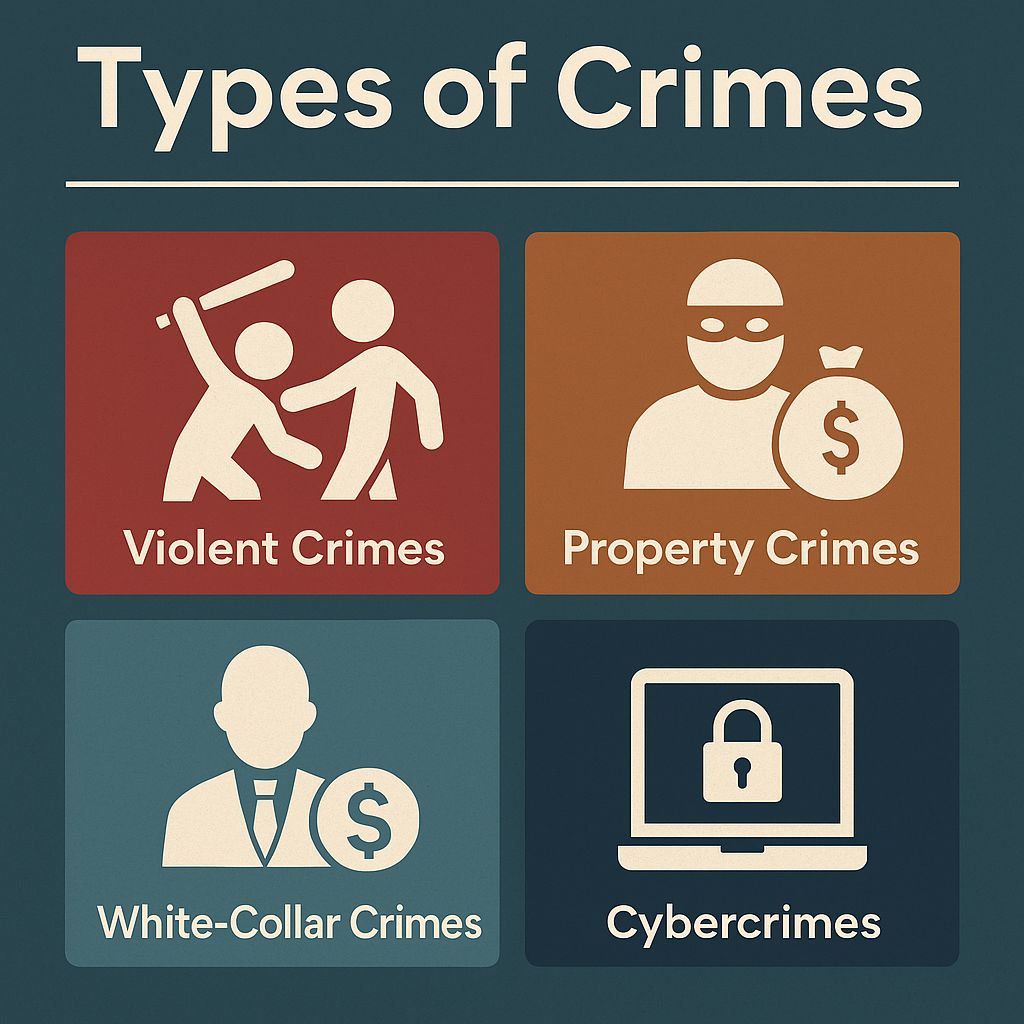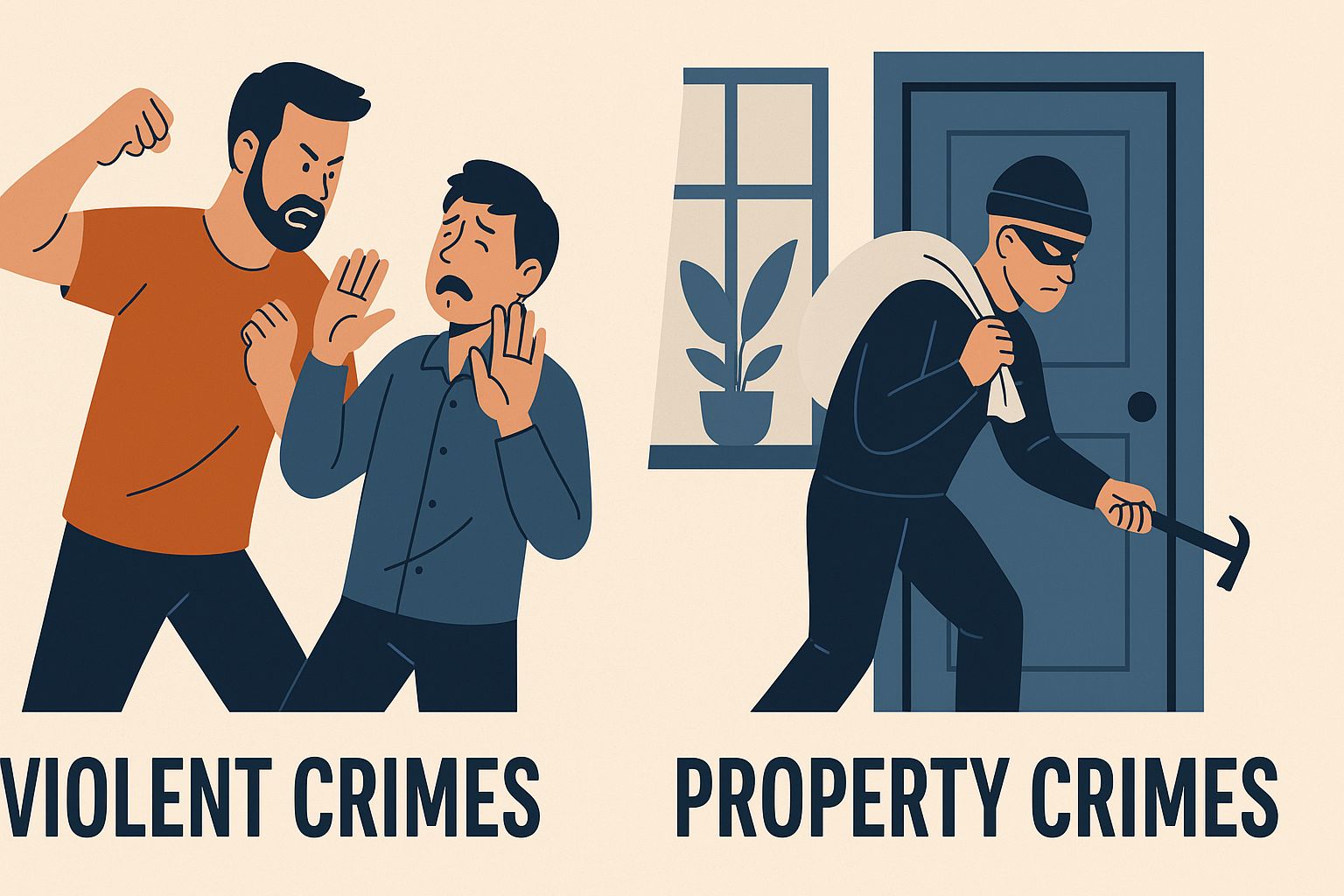Types of Crimes: Legal Perspectives Explained

Understanding the different types of crimes and their legal definitions is essential for navigating the complex world of criminal law. This article explores the various categories of crimes, offering clear explanations and insights into legal perspectives. Whether you're a student, a legal professional, or simply curious about the law, this guide will provide you with a solid foundation in criminal law concepts. The nuances of criminal law are vast, and grasping them can empower individuals to engage more critically with legal systems and societal norms.
Criminal law is not just about punishment. It also reflects the values and norms of a society, providing a framework for resolving disputes and maintaining public order. By examining different types of crimes and their implications, we can gain insight into the priorities and concerns of a given legal system. This article aims to demystify these concepts, equipping readers with the knowledge to understand and analyze the legal structures that govern our lives.
For more on criminal law principles, visit Australian Institute of Criminology.
1. What is Criminal Law?
Criminal law is a body of law that pertains to crime. It deals with acts that are considered offenses against society, the state, or the public. The primary goal of criminal law is to maintain social order and protect individuals by punishing those who commit crimes. It encompasses various statutes, regulations, and legal precedents that define criminal acts and prescribe penalties. By providing clear definitions and consequences for criminal behavior, criminal law serves as a deterrent, aiming to prevent criminal acts before they occur.
Learn more about criminal law at Australian Law Reform Commission.
2. Criminal Law Definition
In simple terms, criminal law refers to the system of laws concerned with punishing individuals who commit crimes. It involves the prosecution by the government of a person for an act that has been classified as a crime. Crimes are typically categorized based on their severity, such as felonies, misdemeanors, and infractions. Felonies, being the most serious, often result in severe punishments like imprisonment, while misdemeanors may involve lesser penalties such as fines or community service.
Criminal law not only defines what constitutes a crime but also outlines the procedures for prosecuting and defending those accused. This includes the rights of the accused, the standards for evidence, and the roles of various participants in the legal process. Understanding these elements is crucial for anyone involved in the legal system, whether as a practitioner, defendant, or juror.
For criminal law procedures, see Queensland Courts.
3. What is Crime?
A crime is any act or omission that violates a law prohibiting it, and for which a government authority can prescribe a punishment. Crimes are considered harmful not only to individuals but also to the community, society, or the state. The concept of crime is inherently tied to the values and norms of a society, as what is deemed criminal in one culture or era may not be in another.
Moreover, crimes are often categorized by their intent and the harm caused. Intent refers to the mindset of the perpetrator at the time of the crime, distinguishing between acts committed knowingly and those that are accidental. Harm, on the other hand, considers the impact of the crime on victims and society at large. These elements are critical in determining the severity of the crime and the appropriate punishment.
Explore crime definitions at Law Society of NSW.
4. Categories of Crimes
Crimes can be broadly categorized into several types, each with its distinct legal implications and penalties. Understanding these categories helps in recognizing the diverse nature of criminal activity and the varied responses required from the legal system. Each category encompasses a range of offenses that share common characteristics, yet differ in their specific elements and consequences.
| Category | Examples |
|---|---|
| Violent Crimes | Murder, Manslaughter, Assault, Battery |
| Property Crimes | Burglary, Theft, Robbery, Arson |
| White-Collar Crimes | Fraud, Embezzlement, Insider Trading |
| Organized Crimes | Drug Trafficking, Human Trafficking |
| Cybercrimes | Hacking, Identity Theft |
For crime categories, explore NSW Courts.

5. Violent Crimes
Violent crimes involve force or threat of force against individuals. They are considered serious offenses due to the harm they inflict on victims. Common examples include:
Murder and Manslaughter: Unlawful killing of another person, either intentionally (murder) or unintentionally (manslaughter). These crimes are among the most severely punished, reflecting society's view on the sanctity of life.
Assault and Battery: Physical attacks or threats to inflict harm on another person. Assault can occur without physical contact, while battery involves actual physical contact or harm.
Violent crimes not only impact the immediate victims but can also instill fear and instability within communities. Legal responses to violent crimes often emphasize both deterrence and rehabilitation, aiming to prevent future offenses while addressing the root causes of violent behavior.
For violent crime details, visit Legal Aid NSW.
6. Property Crimes
Property crimes involve interference with the property of another. These crimes do not necessarily involve harm to another person but can result in significant financial loss. Examples include:
Burglary: Unlawful entry into a building with the intent to commit a crime, usually theft. The intent to commit a crime distinguishes burglary from mere trespassing.
Theft and Robbery: Taking someone else's property without consent. Robbery involves using force or intimidation, elevating its seriousness compared to theft.
Arson: Intentionally setting fire to property. This crime can endanger lives and cause extensive damage, often leading to severe penalties.
Property crimes can have wide-reaching effects, disrupting businesses and communities. Legal systems aim to balance the punishment of offenders with restitution to victims, ensuring justice is served while addressing the broader impact of these crimes.
For property crime information, see Victoria Legal Aid.
7. White-Collar Crimes
White-collar crimes are non-violent offenses committed for financial gain. They typically involve deceit and are committed by individuals in professional positions. Examples include:
Fraud: Deceptive practices intended to secure unfair or unlawful financial gain. Fraud can occur in various forms, from identity theft to elaborate investment scams.
Embezzlement: Misappropriation of funds placed in one's trust or belonging to one's employer. This crime often involves a breach of trust, complicating its legal and ethical considerations.
Insider Trading: Illegal trading of a company's stock by individuals with access to non-public information. This undermines market integrity and can lead to significant financial harm.
White-collar crimes can be challenging to prosecute due to their complexity and the resources required for investigation. However, their impact on the economy and public trust necessitates robust legal frameworks to deter and address these offenses.
For white-collar crime insights, visit Victorian Law Reform Commission.
8. Organized Crimes
Organized crime involves illegal activities carried out by structured groups, often for profit. These crimes can be complex and involve a range of illegal acts, such as:
Drug Trafficking: Illegal production, distribution, or sale of controlled substances. This global issue poses significant challenges for law enforcement and public health.
Human Trafficking: Illegal trade of humans for the purposes of forced labor, sexual slavery, or commercial sexual exploitation. This crime is a grave violation of human rights and requires coordinated international efforts to combat.
Organized crimes often involve sophisticated networks that operate across borders, making them difficult to dismantle. Legal responses must be equally organized, involving collaboration between agencies and jurisdictions to effectively tackle these crimes.
For organized crime information, see Law Council of Australia.
9. Cybercrimes
With the advent of technology, cybercrimes have become increasingly prevalent. These crimes are committed using computers or the internet. Examples include:
Hacking: Unauthorized access to computer systems for the purpose of stealing or altering data. Hacking can result in significant financial and reputational damage to individuals and organizations.
Identity Theft: Using someone else's personal information without their consent to commit fraud or theft. This crime can have devastating consequences for victims, affecting their finances and personal lives.
Cybercrimes present unique challenges due to their technological nature and the speed at which they can occur. Legal systems must continually evolve to address these crimes, developing new tools and strategies to prevent and prosecute cybercriminals effectively.
For cybercrime resources, visit Australian Competition and Consumer Commission.
10. Legal Definition of Crime
The legal definition of crime varies by jurisdiction but generally includes any conduct that is prohibited by law and punishable by the state. Crimes are defined through statutes, which are laws enacted by legislative bodies. These statutes specify what constitutes a crime and the corresponding penalties. Understanding these legal definitions is essential for ensuring that individuals are aware of the boundaries of lawful behavior and the consequences of crossing them.
For legal definitions, explore Australian Government Legislation.
11. What is a Criminal Statute?
A criminal statute is a written law passed by a legislative body that defines a criminal offense and its punishment. These statutes are essential for ensuring that individuals know what conduct is considered criminal and the potential consequences of engaging in such conduct. They provide a clear framework for law enforcement and judicial processes, ensuring consistency and fairness in the application of justice.
Criminal statutes also reflect societal values and priorities, evolving over time to address new challenges and changing perceptions of justice. By examining these statutes, we gain insight into the legal system's approach to crime and punishment, as well as its responsiveness to societal needs.
For criminal statutes, see Victorian Director of Public Prosecutions.

12. Criminal Law in Australia
Criminal law in Australia is governed by both federal and state legislation. Each state and territory has its own criminal code, which outlines offenses and penalties. The Criminal Code Act 1995 is a key piece of federal legislation that applies to all of Australia. This dual system allows for regional variations in law while maintaining a cohesive national legal framework.
| Type | Description |
|---|---|
| Summary Offenses | Minor crimes handled in local courts, e.g., petty theft. |
| Indictable Offenses | Serious crimes requiring jury trials, e.g., murder. |
For Australian criminal law, visit Victoria Justice.
13. Defining Crime in Australian Law
In Australia, crimes are classified as either summary offenses or indictable offenses. Summary offenses are minor and typically dealt with in a local court, while indictable offenses are more serious and require a trial by jury. This classification ensures that the legal response is proportionate to the severity of the offense, optimizing the use of judicial resources.
Australian criminal law reflects the country's commitment to justice and fairness, incorporating principles such as the presumption of innocence and the right to a fair trial. By understanding these principles, individuals can better appreciate the strengths and challenges of the Australian legal system.
For Australian crime classifications, see Legal Aid Queensland.
14. Frequently Asked Questions (FAQ)
Criminal law is a system of laws that punishes individuals for acts classified as crimes against society, aiming to maintain social order and protect individuals.
The main categories include violent crimes, property crimes, white-collar crimes, organized crimes, and cybercrimes, each with distinct legal implications.
Violent crimes include murder, manslaughter, assault, and battery, involving force or threats against individuals.
White-collar crimes, like fraud and embezzlement, are complex, requiring extensive investigation and resources to prove deceit and financial misconduct.
Cybercrimes, such as hacking and identity theft, are tackled through evolving legal frameworks and specialized law enforcement units. Learn more at Australian Cyber Security Centre.
Crimes in Australia are classified as summary offenses (minor, handled in local courts) or indictable offenses (serious, requiring jury trials).
Understanding the different types of crimes and their legal definitions is crucial for anyone interested in the field of law. This knowledge not only helps in comprehending legal proceedings but also in appreciating the importance of laws in maintaining societal order. Whether you're studying law, working in the legal field, or simply interested in how the legal system functions, having a grasp of these concepts is invaluable.
By exploring the various categories of crimes and their legal implications, individuals can better navigate the complexities of criminal law and contribute to a more informed and lawful society. The insights gained from this understanding can also empower individuals to engage more effectively with legal systems, advocating for justice and reform where needed. As societies continue to evolve, so too will the laws that govern them, highlighting the importance of ongoing education and engagement with legal issues.
For additional resources, explore Federation of Community Legal Centres, Australian Lawyers Alliance, College of Law, or Australian Human Rights Commission.
AHL Legal: Your Criminal Law Partner
Need assistance with criminal law matters? AHL Legal specializes in Australian criminal law, offering expert guidance on defense strategies and legal proceedings.
Navigate Criminal Law with Confidence
Facing criminal charges or seeking legal advice can be challenging, but with the right legal partner, you can protect your rights and achieve a fair outcome.
Whether you need assistance with defense strategies or understanding legal proceedings, AHL Legal is here to provide expert support.
✅ AHL Legal: Your Trusted Criminal Law Partner
At AHL Legal, we specialize in criminal law, offering professional and compassionate assistance for all criminal matters. Our team ensures your interests are protected throughout the legal process.
👉 Contact AHL Legal for a confidential consultation or call 1300 91 66 77.
🌐 Visit our website: www.ahllegal.com.au



 1300 91 66 77
1300 91 66 77







 HOME
HOME


